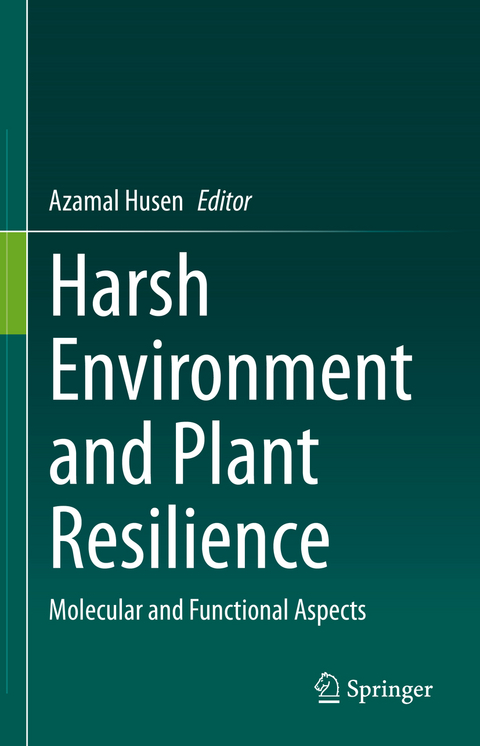
Harsh Environment and Plant Resilience
Springer International Publishing (Verlag)
978-3-030-65911-0 (ISBN)
Plants are influenced by the adverse environmental conditions at various levels, their different and diverse responses play a significant rolein determining their growth, production and the overall geographical distribution. The chapters in this book focus on the biological mechanisms and fundamental principles that determine how different plant species grow, perform and interact with a challenging environment.
This book covers a broad range of topics in plant science, including gene function, molecules, physiology, cell biology and plant ecology, to understand the functioning of plants under harsh environmental conditions. The book elucidates the physiological and molecular mechanisms in different plant species, ecophysiological interactions of plants, interplay between plant roots, arbuscular mycorrhizal fungi and plant growth-promoting rhizobacteria, biosensors for monitoring stress, production of secondary metabolites, stress alleviation processes, and more.
lt;p>Professor Azamal Husen (MSc from Hamdard University, New Delhi, India; and PhD from Forest Research Institute, Dehra Dun, India) is a Foreign Delegate at Wolaita Sodo University, Wolaita, Ethiopia. He has served the University of Gondar, Ethiopia, as a Full Professor of Biology, where he also worked as the Coordinator of MSc Program and the Head, Department of Biology. He was also a Visiting Faculty of the Forest Research Institute, and the Doon College of Agriculture and Forest at Dehra Dun, India. He has more than 20 years of teaching, research, and administrative experience. Husen specializes in (i) biogenic nanomaterials fabrication and their applications in cutting-edge areas, (ii) plant response to nanomaterials, (iii) physiological/biochemical/molecular strategies adopted by agricultural crop species for their sustenance under often-challenging environments, (iv) herbal medicine, and (v) clonal propagation and improvement of tree species. He has conducted several research projects sponsored by various funding agencies, namely the World Bank, the Indian Council of Agriculture Research (ICAR), by the Indian Council of Forest Research Education (ICFRE); and the Japan Bank for International Cooperation (JBIC) etc. In brief, he has produced over 100 research papers, review articles, book chapters, edited international books, produced some conference papers, and over a dozen of manuals and monographs. Husen received four fellowships from India and a recognition awards from University of Gondar, Ethiopia, for excellent teaching, research, and community services. An active organizer of seminars/conferences and an efficient evaluator of research projects and book proposals as he is, Husen has been on the Editorial board and the panel of reviewers of several reputed international journals. He is included in the advisory board of Cambridge Scholars Publishing, UK. He is also a fellow of the Plantae group of the American Society of Plant Biologists, member of the International Society of Root Research, Asian Council of Science Editors etc. Dr. Husen is also the Editor-in-Chief of American Journal of Plant Physiology.
1. The harsh environment and resilient plants - An overview.- 2. Expression and regulation of stress-responsive genes in plants under harsh environmental conditions.- 3. Genome editing: A tool from the vault of science for engineering climate-resilient cereals.- 4. Advancement in molecular and fast breeding programmes for climate resilient agriculture practices.- 5. Recombinant DNA technology for sustainable plant growth and production.- 6. Regulatory role of micro-RNAs in plants under challenging environmental conditions with special focus on drought and salinity.- 7. Molecular mechanisms of heat shock proteins for sustainable plant growth and production.- 8. Physiological and molecular responses to heavy metals stresses in plants.- 9. Morpho-anatomical, physiological, biochemical and molecular responses of plants to air pollution.- 10. Physiological and molecular responses to high, chilling and freezing temperature in plant growth and production: consequences and mitigation possibilities.- 11. Physiological and molecular responses to salinity due to excessive Na+ in plants.- 12. Physiological and molecular responses to drought, submergence and excessive watering in plants.- 13. Mitogen-activated protein kinase, plants and heat stress.- 14. Cross talk between heme oxygenase 1 and lateral root development for salt tolerance.- 15. Salt-tolerant plant growth promoting rhizobacteria: A new-fangled approach for improving crop yield.- 16. Improving resilience against drought stress among crop plants through inoculation of plant growth-promoting rhizobacteria.- 17. Trends in biosensors and current detection methods for stress monitoring of plants growing in adverse environmental conditions.- 18. Secondary metabolites for sustainable plant growth and production under adverse environment conditions.- 19. Medicinal plants and their pharmaceutical properties under adverse environment conditions.- 20. Progress and major research challenges under changing environmental conditions.
| Erscheinungsdatum | 08.04.2021 |
|---|---|
| Zusatzinfo | XVI, 542 p. 43 illus., 38 illus. in color. |
| Verlagsort | Cham |
| Sprache | englisch |
| Maße | 155 x 235 mm |
| Gewicht | 998 g |
| Themenwelt | Naturwissenschaften ► Biologie ► Botanik |
| Naturwissenschaften ► Biologie ► Genetik / Molekularbiologie | |
| Weitere Fachgebiete ► Land- / Forstwirtschaft / Fischerei | |
| Schlagworte | Changing environments • Physiological mechanisms • plant biochemistry • plant hormones • Plant Production |
| ISBN-10 | 3-030-65911-9 / 3030659119 |
| ISBN-13 | 978-3-030-65911-0 / 9783030659110 |
| Zustand | Neuware |
| Informationen gemäß Produktsicherheitsverordnung (GPSR) | |
| Haben Sie eine Frage zum Produkt? |
aus dem Bereich


